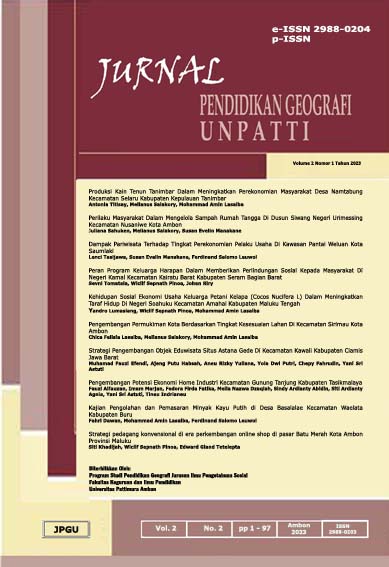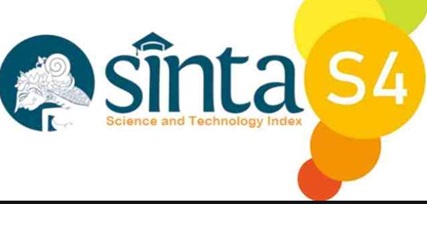The Effect of Implementing the Problem Based Learning Model on Problem-Solving Skills in Geography Social Studies for 8th Grade Students at SMP Negeri 66, Central Maluku
Pengaruh Penerapan Model Problem Based Learning Terhadap Kemampuan Memecahkan Masalah Pada Mata Pelajaran IPS Geografi Kelas VIII SMP Negeri 66 Maluku Tengah
Abstract
This research aims to determine the influence of the Problem Based Learning model on the ability to solve problems in the IPS Geography subject in class VIII SMP Negeri 66 Central Maluku. Because studying geography is not only being able to understand concepts, but also being able to apply these concepts in solving geographic problems. Solving Problems can be seen as a process, because in solving problems a series of concepts, rules and information that are known are used to solve the problem. Students are required to think systematically to solve geographic problems. Therefore, in teaching geography teachers should be able to create a learning atmosphere. , This type of research uses a quantitative approach to calculate the percentage of numbers from the results of the questionnaire regarding the influence of the problem based learning model on the ability to solve problems in geography subjects. So it can be concluded that there is a significant influence between problem based learning (variable x) on problem solving variables (y) Then, it can be seen from the calculation of the coefficient of determination that the problem based learning variable (x) influences problem solving (y) by 53.2% (R.Square in the Summary Model) while 46.8% is influenced by other variables which were not examined. in this research
Downloads
References
Dopo, W. (2022). Pembelajaran Berbasis Masalah, Sebuah Strategi Pembelajaran Untuk Menyiapkan Kemandirian Peserta Didik. Jurnal Teknodik, 353–363. https://doi.org/10.32550/teknodik.vi0.35
Fuad, A. Z., & Alfin, J. (2017). Transformasi tujuan pendidikan nasional perspektif pendidikan Islam. Humanis: Jurnal Ilmu-Ilmu Sosial Dan …, 9, 113.
Mansur, N. (2018). Melatih Literasi Matematika Siswa dengan Soal PISA. Prisma, Prosiding Seminar Nasional Matematika. 1, 140–144. https://journal.unnes.ac.id/sju/index.php/prisma/
Marakey, Y. F., Lasaiba, M. A., & Pinoa, W. S. (2022). Pendapatan Pedagang Pasar Batu Meja di Jalan Sirimau Kota Ambon dalam Upaya Pemenuhan Kebutuhan Hidup Sebelum dan Selama Pandemi Covid-19. Jurnal Pendidikan Geografi Unpatti, 1(1), 12–26. https://doi.org/10.30598/jpguvol1iss1pp12-26
Maulido, S., Karmijah, P., & Sekolah, P. L. (2024). Upaya Meningkatkan Pendidikan Masyarakat Di Daerah Terpencil Vinanda Rahmi. Jurnal Sadewa: Pembelajaran Dan Ilmu Sosial, 2(1), 3021–7377. https://doi.org/10.61132/sadewa.v2i1.488
Nelayan, A., Ikan, T., Ekonomi, S., & Tenggara, K. M. (2023). Pengembangan Kemampuan Soft Skill Peserta Didik dengan Mengunakan Model Pembelajaran Kooperatif Learning di SMP Negeri 4 Nirunmas. Jurnal Pendidikan Geografi Unpatti, 2(April), 123–130.
Nur, I. M. (2014). Penerapan Pembelajaran Berbasis Masalah. Edutech, 1(2), 211–230.
Nurida, W., Tetelepta, E. G., & Manakane, S. E. (2022). Pengaruh Lingkungan Sekolah Terhadap Minat Belajar Siswa Di SMA Negeri 7 Seram Bagian Barat Kecamatan Huamual Belakang Kabupaten Seram Bagian Barat. Jurnal Pendidikan Geografi Unpatti, 1(3), 227–232. https://doi.org/10.30598/jpguvol1iss3pp227-232
Rumasukun, J., Tetelepta, E. G., & Manakane, S. E. (2023). Pengaruh Model Pembelajaran Jingsaw terhadap Minat Belajar Peserta Didik di SMA MAN 2 Maluku Tengah. Jurnal Pendidikan Geografi Unpatti, 2(April), 123–130.
Sampe, M., Salakory, M., & Tetelepta, E. D. (2023). Strategi Peningkatan Pendapatan Pedagang Usaha Mikro Kecil Dan Menengah UMKM (Pondok Kecil) Untuk Memenuhi Kebutuhan Keluarga (Studi Kasus Di Negeri Passo Kecamatan Baguala Kota Ambon). 2(April), 123–130.
Santika, I., Parwati, N. N., Divayana, D., Kunci, K., Pemecahan, K., Matematika, M. ;, Pembelajaran, M., Masalah, B., Prestasi, ;, & Matematika, B. (2020). Pengaruh Model Pembelajaran Berbasis Masalah Dalam Setting Pembelajaran Daring Terhadap Prestasi Belajar Matematika dan Kemampuan Pemecahan Masalah Siswa Kelas X SMA. Jurnal Teknologi Pembelajaran Indonesia, 10(2), 105–117. https://ejournal-pasca.undiksha.ac.id/index.php/jurnal_tp/article/view/3397
Sari, C. P. (2018). Faktor-Faktor Penyebab Rendahnya Minat Membaca Siswa Kelas IV. Jurnal Pendidikan Guru Sekolah Dasar, 7(32), 3128–3137. http://journal.student.uny.ac.id/ojs/ojs/index.php/pgsd/article/viewFile/13875/13400
Siahaan, A., Akmalia, R., Ray, A. U. M., Sembiring, A. W., & Yunita, E. (2023). Upaya Meningkatan Mutu Pendidikan di Indonesia. Journal on Education, 5(3), 6933–6941. https://doi.org/10.31004/joe.v5i3.1480
Susilawati, S. (2016). Cara Memilih Strategi Pembelajaran Geografi Dalam Kurikulum 2004. Jurnal Geografi Gea, 6(2). https://doi.org/10.17509/gea.v6i2.1736
Ulya, H. (2016). Profil Kemampuan Pemecahan Masalah Siswa Bermotivasi Belajar Tinggi Berdasarkan Ideal Problem Solving. Jurnal Konseling Gusjigang, 2(1), 90–96. https://doi.org/10.24176/jkg.v2i1.561














